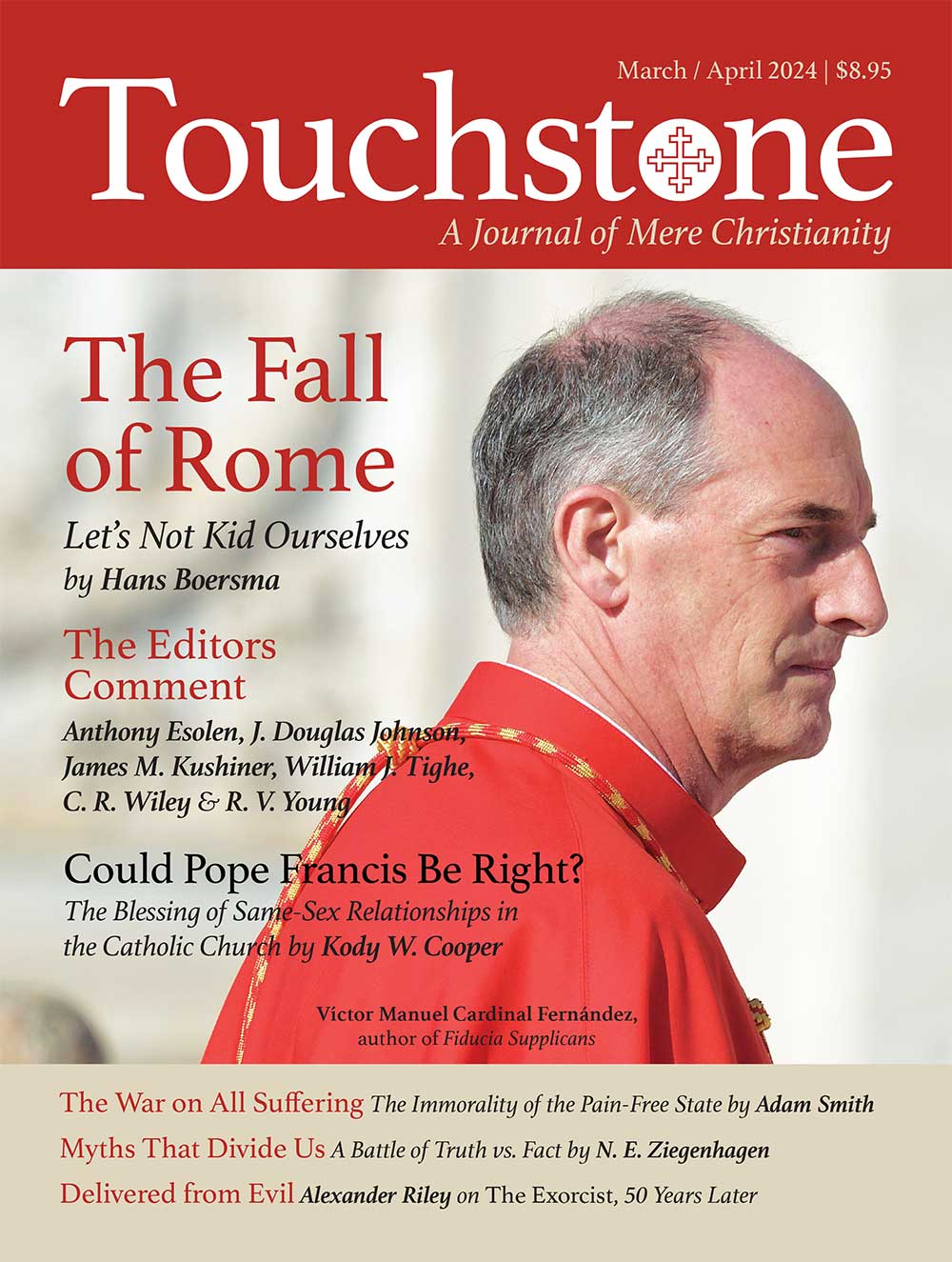Teaching Ecclesiastes
on the Hope of Smoke
Last May my wife and I watched our eldest son walk across the stage of John Carroll Catholic High School in Birmingham, Alabama. I felt like Reb Tevye: “Is this the same boy I taught to throw a baseball? When did all this growing up happen?” The whole experience was fun and joyous. The whole thing hurt, too. In these moments, the preacher of Ecclesiastes—Qoheleth—continues to haunt and help me. I could hear him saying throughout the graduation experience, “I told you so.”
“Hevel hevelim,” says Qoheleth, “All is hevel.” This well-known phrase, best known as “Vanity of vanities, all is vanity,” animates the whole of Ecclesiastes’ wisdom. Coming to terms with this phrase sets readers of the book on a trajectory of understanding and reception. To misunderstand hevel is to misunderstand the book. Translating hevel, however,remains tricky business. The word is a metaphor, and metaphors resist hard and fast denotations. They are associative by nature, calling on readers to make links between the image and an encyclopedia of experiences and knowledge that they carry around with them wittingly and unwittingly.
For example, take God is a rock. Well, no, God isn’t, but there must be something about “rockness” that might aid my understanding of God. Back we go to the verdant encyclopedia of our experiences and knowledge to forage around for some help: strength, stability, longevity. All these and more are rock-like qualities. They offer insight into the character of God and his self-giving. Far from distracting us from “the thing itself,” metaphors aid our understanding of it. In fact, we make sense of the world by metaphoric strategies all the time. The great preacher of Ecclesiastes wants his readers to understand the nature of human existence, life under the sun, as he calls it. What is the nature of life under the sun for Qoheleth? Hevel is the answer.
All Smoke
Several years back, I noticed a cigar butt in a lectern while lecturing at a seminary in Florida. It caught me by surprise because this isn’t the sort of thing you see in a seminary context, or at least not the ones I know. I asked someone at the seminary for the story behind the cigar. The week before my lectures, I was told, a well-known Old Testament scholar gave lessons on the biblical Wisdom literature. When Ecclesiastes rolled around—pun intended—the professor pulled a cigar from his pocket, lit its open face, and drew on it. The students must have thought this was pretty fantastic. Professors only have so many tricks up their sleeves, and this one ranks up there. Why did he do this? He was illustrating for the students the linguistic heartbeat of Ecclesiastes: hevel.
After the professor lit the cigar, he blew out a plume of smoke and pointed to it while it faded away into nothingness. While the students stared, the professor pronounced a single word: “hevel.” Exactly. Hevel signifies smoke or breath or wind. While hevel can serve several connotative purposes in the Old Testament, even describing the worthlessness of pursuing idols (Jer. 10:3), at its core it means breath, and smoke illustrates in material form what breath is. Qoheleth links our lives under the sun with the image of “smoke.”
Smoke, nothing but smoke. [That’s what the Quester says.]
There’s nothing to anything—it’s all smoke. (Eccl. 1:2—The Message)
Metaphors can lose something of their associative and fruitful character when a translation mutes the metaphor for a single interpretive conclusion. Study notes and commentaries make such moves for the sake of explanation and should do so. But translations do better when, if possible, the metaphors are left intact. “O my love is like a red, red rose” falls apart if “red, red rose” is replaced with “lovely” or “delicate” or “precious.” When the NIV settles on “meaningless” for hevel, it overexplains the metaphor and sets an interpretive trajectory for the whole book, running the real risk of limiting hevel’s metaphoric range. Read in these terms, the smoke of hevel illustrates the meaninglessness of human existence and leaves us there.
This reading strategy sets Ecclesiastes comfortably next to the despair literature of the early twentieth century. Kafka’s cockroach and Camus’s stranger nestle on each side of Ecclesiastes above the flickering fireplace of our humanity. Reading these three books together can make for a cold evening. Bring in the pessimist philosophical tradition of Schopenhauer and Nietzsche and coldness turns into a downright freeze. To read hevel as “meaningless” makes Qoheleth, Schopenhauer, and Nietzsche co-belligerents in their quest to shoulder-shake humanity into recognizing what Nietzsche calls the “nauseous” character of human existence.
These kinds of pessimistic reading strategies are readily on offer with our lugubrious Qoheleth. One such reading sees the whole of Ecclesiastes as pessimistic despair, with the last two verses of Ecclesiastes 12 functioning as a kind of slap across the face to snap us out of it: “Hey, forget all that nonsense and fear God.” This approach to the book is understandable. The dark clouds of Ecclesiastes loom large. Translating hevel as “meaningless,” however, allows a particular metaphoric association more determinative space than it should have. More than this, reading hevel in this way is a possible misapprehension, limiting hevel and the whole book to one dark path.
Mark Gignilliat is a professor of divinity at Beeson Divinity School, Samford University. He also serves as the director of Beeson’s newly launched Ph.D. program in Theology for the Church and as theologian-in-residence at St. Peter’s Anglican Church in Birmingham, Alabama.
subscription options
Order
Print/Online Subscription

Get six issues (one year) of Touchstone PLUS full online access including pdf downloads for only $39.95. That's only $3.34 per month!
Order
Online Only
Subscription

Get a one-year full-access subscription to the Touchstone online archives for only $19.95. That's only $1.66 per month!
bulk subscriptions
Order Touchstone subscriptions in bulk and save $10 per sub! Each subscription includes 6 issues of Touchstone plus full online access to touchstonemag.com—including archives, videos, and pdf downloads of recent issues for only $29.95 each! Great for churches or study groups.
Transactions will be processed on a secure server.
more from the online archives
calling all readers
Please Donate
"There are magazines worth reading but few worth saving . . . Touchstone is just such a magazine."
—Alice von Hildebrand
"Here we do not concede one square millimeter of territory to falsehood, folly, contemporary sentimentality, or fashion. We speak the truth, and let God be our judge. . . . Touchstone is the one committedly Christian conservative journal."
—Anthony Esolen, Touchstone senior editor











